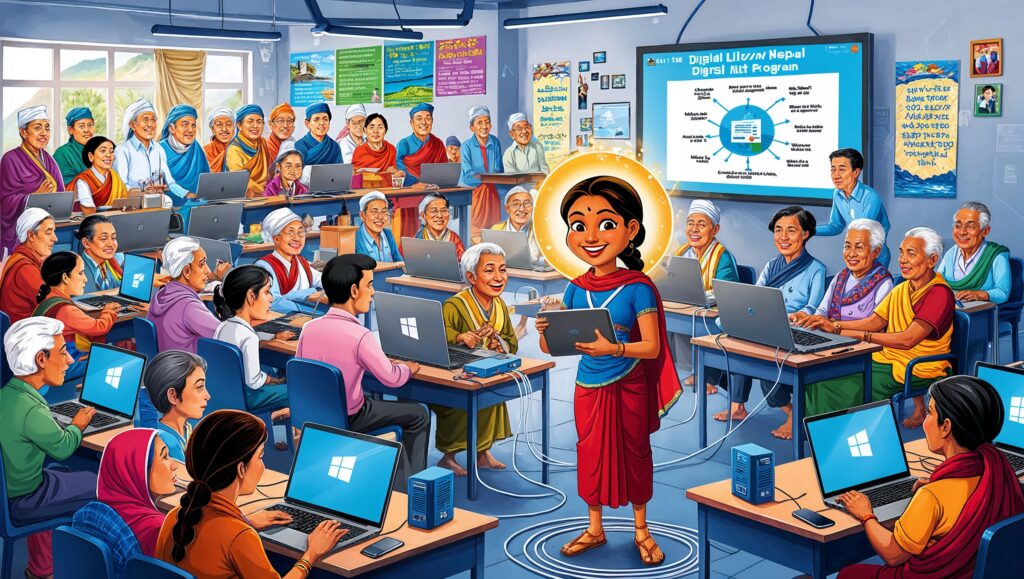This paper notes that Nepal has effectively begun the process of addressing the digital divide through the introduction of an extensive national digital literacy effort. The program announced by the Ministry of Education, Science, and Technology on Wednesday will seek to build technology literacy among millions of Nepalis within the next five years.
The program, known as ‘Digital Nepal for All’ is intended for the inhabitants of all the 77 districts of the country with a focus on rural and hard to reach areas. It will make provision for free computer illiteracy lessons related to the use of computers, the World Wide Web and correspondence applications to school going children, college students, workers, business persons and elders or senior citizens.
Speaking at the launch program in Kathmandu, Education Minister Giriraj Mani Pokharel said that education in the current world is incomplete without digital literacy. ‘Skills in the use of the Information Technology recently can no longer be considered as the ‘nice to have’ but rather it is the ‘have to have’ given the current interconnected global economy,’ he said. ”This program will enable our citizens to be active participants in the new world digital era to improve education, employment, and business.
This initiative will be through the community learning centers, the schools, and the mobile training workshops. The government aims to open 5000 new technologies in the computer and high-speed internet-aided learning centers with professional teachers throughout the country. These centers will provide set-up courses and casual classes for individuals who require certain skills or help.
Another part of the program will consist of creating an open, full-fledged online educational platform that will provide free courses in Nepali and other languages of the country. This platform will allow independent learning, downloads, or access to any educational material anywhere, even where access to physical structures is impossible.
To guarantee the efficiency of the program the government collaborates with the most successful technology companies and international organizations. These collaborations will bring not only financial support and specialized equipment but also outside perspectives on how the curriculum can be shifted to better fit in the international educational context as well as expectations of employers.
This call has been applauded by teachers and technologists in equal measure. Dr. Sanjay Sharma, a computer science teacher at Tribhuvan University, said, ‘It is useful that the program is open for all.’ He said that because this initiative is targeting all segments of society, it will usher in digital Nepal. ‘The fact that more emphasis is placed on rural regions, which are in terms of Internet coverage the most disadvantaged’.
Women, disable people and ethnic groups are also protected in the program with some special arrangements. Special lasting ones will be provided depending on the needs of those communities to overcome the barriers they experience in using digital technologies.
However, apart from basic computer classes, other classes will include coding, digital marketing and data analysis among others. These particular courses should help produce a qualified pool of employees equipped for managing the future development of Nepali information technology and secure outside investment in related markets.
The government has set a large amount of money for the program, along with other funding proposals from international donors and private partners. Hol however, some critics have claimed that the future health of the initiative is questionable, especially perhaps with regards to the maintenance of the structure over time and the ability to constantly update the curriculum learning of the cost due to constant advances in technology.
To these concerns, Minister Pokharel pledged that long-term sustainability strategies are also in place for this program. ”We have existing systems for the delivery of supplemental curricular evaluations and continuous professional development of the teachers,” he said. “We are also investigating measures of innovating the funding strategies such as adopting the public-private partnership funding strategy to help fund the program after the first five years.”
Digital Nepal for All is launched at the right time as COVID-19 has propelled the importance of digital knowledge and literacy in education, health care, and commerce. With such tools in its hands, Nepal has dual benefits of preparing its citizens for the future digital scenarios and at the same time handling the eradicating social and economic disparity.
When the program will be implemented across the country, policymakers and development experts will be observing the pace of the program. If this venture achieves the intended goal it would help set a precedent for other third world countries who wish to improve the literacy level of the people and in the process change the face of the digital world in the coming years.


